13:30
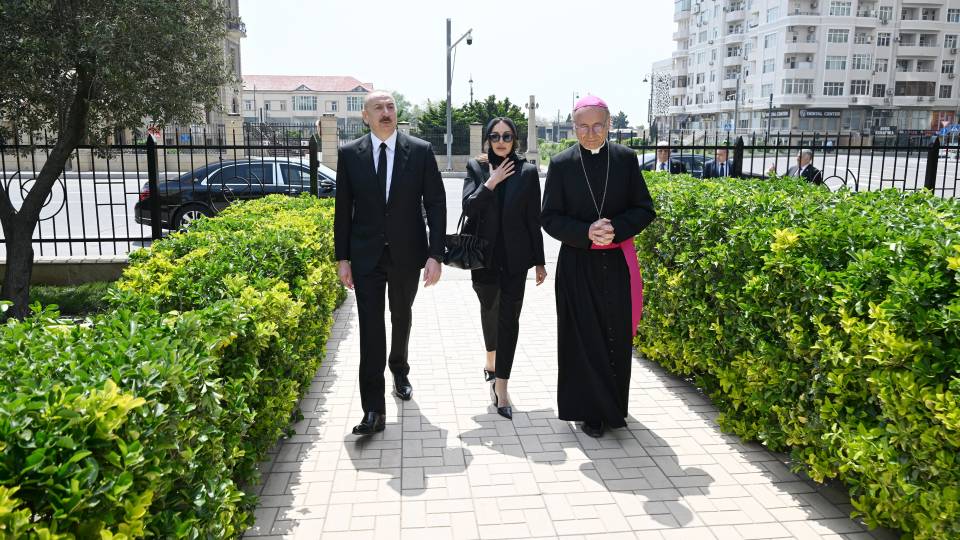
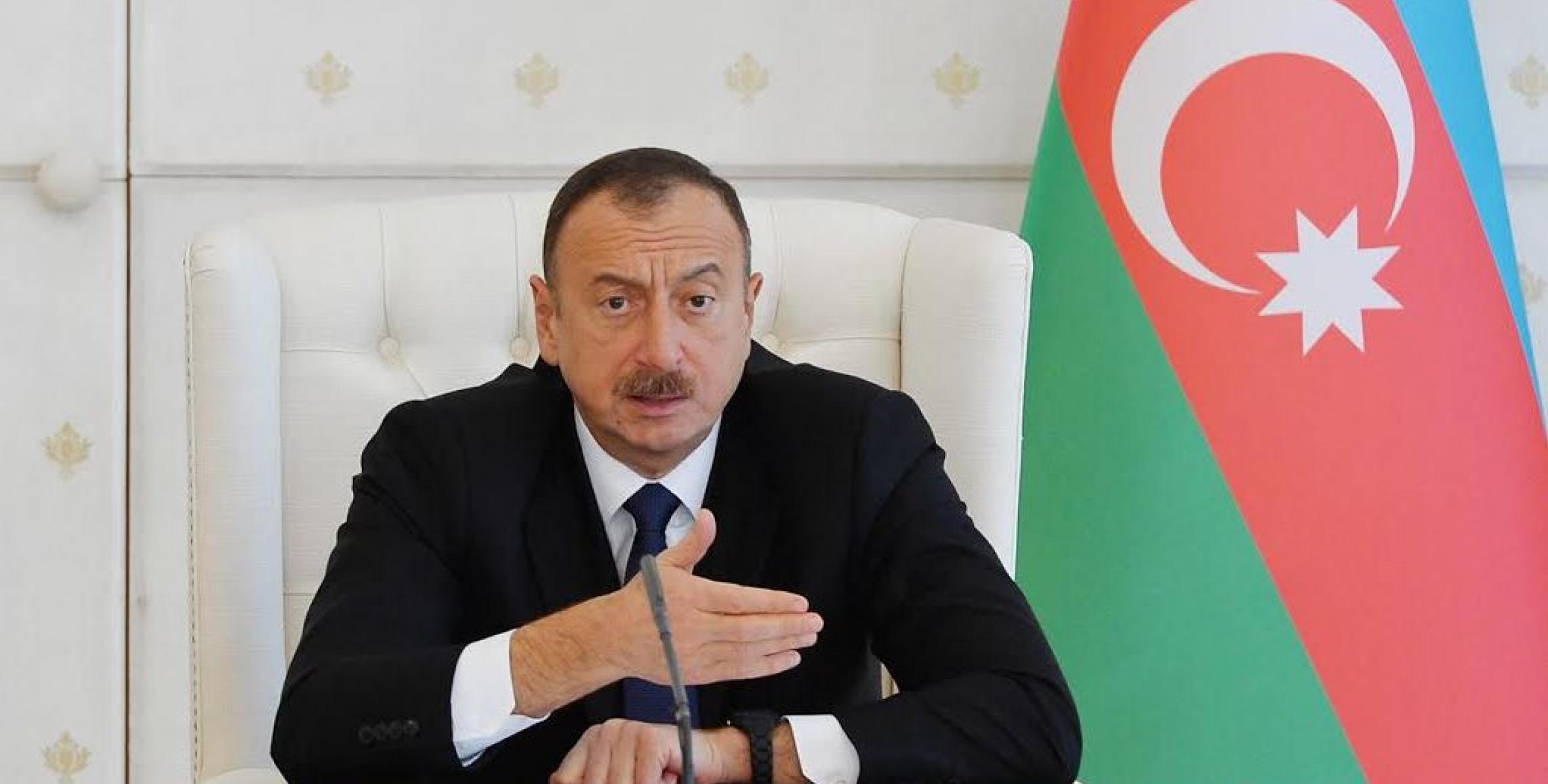
I would like to note once again: I have no doubt that all the objectives facing the country will be met before the end of the year. Azerbaijan will continue its path of successful development.
Regarding the next issues on our agenda, first of all, of course, we should pay more attention to the construction of the army.
In recent years, we have made great strides in this area. A lot has been done. The material and technical infrastructure of our army has strengthened. Today, the Azerbaijani army is among the strongest armies in the world both in terms of material and technical equipment, and in terms of combat capability. We live in a time of war. Our lands are under occupation. Of course, under such circumstances, more attention should be, is and will be paid to the construction of the army.
Of course, in order to achieve this, our economy should grow even faster. Therefore, as I said, economic reforms and economic development precondition our overall development. Economic independence facilitates political independence of our country. Today we are conducting an independent foreign policy. As I have already noted, it is a policy of good will. We want conflicts in the world to be settled, we want there to be no hotbeds of standoff and we want stability, especially in our region. Therefore, I want to note once again: Azerbaijan is one of the countries pursuing a successful independent foreign policy on a global scale. Of course, the foundation and the basis of this is economic independence, the unity between the people and the government. Therefore, all necessary steps will be taken in the economic field to ensure sustainable development of our country.
I should note that in order to improve the business environment, very important steps have been taken to provide businesses with even greater support. In particular, I want to note that my instructions related to audits are being implemented. I must say that in the first quarter of 2016, a total of 34 businesses were examined. This does not include tax audits. For comparison, let me say that 19,300 inspections were carried out in the first quarter of 2015. And this year there are 34. There is no need to comment on these figures. Thus, Azerbaijan is rapidly developing free enterprise and free competition. We still are at the beginning of this road. I am confident that through these measures and further transparency in the economic sphere, entrepreneurship in Azerbaijan will develop even faster. Azerbaijan will attract even greater foreign investment. The attraction of foreign investment requires legal framework, a transparent economic and financial system, and the rule of law. If we look at the experience of other countries, we can see that countries that have embarked on a path of dynamic development went this way and managed to become very attractive for foreign investment. Any country today is trying to attract foreign investment. Even the states possessing large financial resources do that, because it means additional money, financial resources and the creation of additional opportunities. We should also go this way.
Steps have been taken to encourage investment. In January of this year, a decree was signed. A decree on additional measures related to investment promotion was signed in January. I am sure that this decree will significantly increase the amount of investment to be made in Azerbaijan.
The process of strengthening and rehabilitation of the banking sector is under way. important steps have been taken in this direction. Important steps have been taken in the area of financial control and in other directions. I believe that this will serve the development of the banking sector. The decision has been made on complete insurance of deposits. This is also of social nature and, of course, increases public confidence in the banking sector. Currently, all deposits are insured. I believe that dollarization trends will be prevented in the future. Unfortunately, a significant portion of deposits today is kept in dollars, which, of course, is not a positive development for the economy.
The exchange rate of the manat has stabilized. I think that situation in this direction will gradually evolve for the better. But it is a natural process. Of course, as confidence in the local currency increases, people will decide themselves. No-one can force anyone to do anything. The state and the government should take steps for people to be more interested in keeping their deposits in manats.
The rapid development of the non-oil sector should be provided in the future too. As I said in my opening remarks, projects worth about 2 billion manats have been developed. Business people need to implement these projects now. Of course, private banks have to play a fairly large role here. In general, the recovery of the banking sector will facilitate that. In order to lend funds, banks are now looking for projects that would generate income themselves. Therefore, the public and private sectors here work in partnership. We are pursuing one same goal – to develop the country's economy even faster.
Entrepreneurs on the ground should have all the conditions. I have repeatedly spoken about this issue. These conditions should be created by local executive bodies. The activities of local executive agencies will be determined primarily by the pace of economic development in these regions and districts, because the main task today is to ensure socioeconomic development of each district. It is necessary to create new jobs, new production areas and production sites of export orientation. Industrial zones will be established in each district.
I am told that there is a lot of unused land in the districts. We must seriously address this issue. We could take both administrative and incentive measures. Companies and people receiving land but not using them for a long time should behave more responsibly. If they do not use these lands, certain mechanisms must be applied.
As long as we have not provided ourselves with food products by 100 per cent, we cannot allow these lands to remain unused for many years. So this is another objective I am setting today. Both local and central executive authorities should work together here.
In the near future, a program on the construction of social housing will be presented to the public. This is a new initiative. Some countries are applying this practice. We have studied and are still studying the best practices. There is a great need and demand for that. In the near future, we will begin the process of building social housing.
In order to reduce unemployment in the regions and address the housing problems of the low-income population with limited material possibilities, the construction of social housing will begin in all the cities and regional centers. I want to emphasize this: not only in Baku and major cities, but also in all cities and district centers. Using international experience, we will set the rules of ownership of such housing, and the procedures for providing the people placed in such homes with property rights. The main goal of social housing is to resolve the housing problems of low-income people by providing them with such housing at a low price and on long-term loans, thus improving their well-being. The construction of such housing will be carried out extensively both in Baku and all other cities and districts. Given the fact that provision of new housing to the population will generate new consumer needs, the construction of social housing, along with the creation of additional jobs and meeting the needs of the population needing such homes, will also promote the development of up to 20 other industries. Naturally, it will give a huge boost to the construction sector. People who once worked in the construction sector but have lost their job today will once again it will be provided with employment, which will give a have multiplier effect.
Additional measures will be taken to create jobs. In my opening remarks, I noted that by taking prompt action, we have created 31,000 permanent jobs in a short time, most of them in the public sector. Private entities were also encouraged to try to avoid cuts. The social responsibility of businesses comes to the fore here. At the same time, as a result of additional measures, particularly in the private sector, we should create tens of thousands of new jobs, as I have already noted, in the construction and agricultural sectors. I will focus on our plans related to agriculture later.
It was mentioned here that issues related to targeted social aid are being addressed. We need to create the conditions for people to be provided with jobs. However, targeted social assistance is a very important social initiative, and we are implementing it. But in some cases this intensifies dependency tendencies. Therefore, we have to conduct a very serious and thought-out policy here in order for people to work and earn money. To this end, we are launching public works in the districts, in Baku and other large cities. State companies have been instructed to create thousands of new jobs. But sometimes we see that people do not want to take advantage from these jobs and prefer to receive targeted assistance from the state. Therefore, we need to pursue a very precise policy in this area. The state will always pay attention to those who are truly in need. But able-bodied people, young citizens should have a job, work, earn and thus build their future life. After all, dependency is a bad thing. Azerbaijan has made great strides in fighting poverty. Poverty in Azerbaijan is at a low level. Of course, for people to work, there should be jobs, and they are being created. Funds have been allocated to ensure self-employment both in the public and private sectors. So, this is a very serious matter, which must be resolved.
The implementation of infrastructure projects by the state continues. This includes gasification, power supply, water supply and the construction of rural roads. This year we will implement over 40 rural road projects. For this purpose, funds in the amount of 250 million manats are envisaged. In all our districts, the construction of rural roads will become even more widespread this year. This is a social and economic project. At the same time, thousands, tens of thousands of new jobs are being created within these projects, so that citizens are provided with jobs. In general, we must work hard to revive the construction sector. In the city of Baku there are quite a few buildings that are in disrepair. Pilot projects are being implemented. The first project began to be implemented in Sabunchu District. People are very happy with that. They are temporarily housed elsewhere. These houses are knocked down and beautiful and modern buildings constructed instead. They are given the opportunity to get rid of old apartments which are in disrepair. They will live in new houses and apartments. They will have a wider living area. This is very important in economic terms. But first of all, we have started to implement it as a social project. Now this process has begun in other districts: in Garadagh and in all districts. In each district of Baku there are buildings that are in disrepair. Of course, these structures have to be demolished and people living there should be provided with good housing either in the public or private sector. Public and private sectors can work together in this. To do this, we just have to create conditions, and we are doing that. I believe that this year this process will become widespread. The construction of social housing, as well as the construction of buildings instead of those in poor condition, i.e. beautiful high-rise buildings, will give a huge boost to the construction sector.
In my opening remarks, I noted that work is under way in the transport sector to create the East-West and North-South corridors. To create the East-West corridor, Azerbaijan suggested to neighboring countries, in order to attract more cargo, pursuing a common tariff policy. This issue was discussed with our Georgian and Turkish counterparts. It was discussed within the framework of my state visit to China at the end of last year. The project on the restoration of the ancient Silk Road is of paramount importance. We should not consider our work finished after the construction or connection of railways. We need to pursue a proper and consistent tariff policy so that all goods could pass through our territory. We cannot do that alone. We are doing it and, as you know, quickly transport cargo in a number of cases with a 40-per cent discount. But this should be doing by all the countries participating in these corridors. If we reduce the tariffs and other countries do not and actually raise them, then we will simply lose. Therefore, we have initiated the creation of a Coordinating Council to conduct a uniform tariff policy, so that the shipper could know the cost of transportation. This process has been given a boost on the initiative of Azerbaijan again.
This year, we need to do more work to establish the Alat international seaport. As you know, we are doing this in stages. We have now completed the first part of the first stage, but the first step should be fully implemented in the near future. Additional funds should be allocated to ensure that our infrastructure and logistics capabilities are consistent with the increasing needs. The creation of all roads and corridors requires exactly that. It is good that we have launched this project. The Alat port will become the largest trading port in the Caspian Sea. As you know, the construction of ports is carried out in neighboring countries of the Caspian, and coordination is very important here. We are taking the necessary measures in this direction.
It is important to continue environmental measures. In recent years, a huge amount of work has been done in this direction both in Baku and the regions. I think that the people of Baku are feeling it every day. The air in Baku is much cleaner now. Air criteria in Baku are currently at a high level. Every citizen feels that. Some people forget what it was like before. But we remember that.
Several strategic projects have been implemented. Among them, of course, I want to emphasize the elimination of the Balakhani landfill and the construction of a large incinerator there. The air of our city used to be poisoned by the Balakhani dump. It kept burning, the smoke enveloped our city and air pollution in that area was too high. This was a major environmental and health project. I am glad that it has been implemented, and the whole area has been cleaned. This site has been landscaped and become prettier. The Balakhani Technology Park is being set up there.
Last year, the first stage of cleaning Lake Boyukshor was completed. It is also located near the Balakhani landfill. Produced water and sewage were dumped here for decades. It was a zone of an environmental disaster.
Today, the lake is used by migratory birds. A beautiful boulevard has been created around it. Landscaping work is under way and this area has turned into a beautiful place for recreation. Currently the second phase of cleaning Lake Boyukshor is on the agenda.
The cleaning of the Bibi-Heybat Bay has been successfully completed. It used to be the site of an environmental disaster as well. There are beautiful parks there now. A part of the European Games was conducted there. A large aquatic center and other sports facilities have been built. Landscaping areas and boulevards have been created on the area between the Flag Square and the Bibi-Heybat Bay. Of course, the bay was polluting our city. Balakhani was on one side and the Black City was on the other. There, too, a lot of cleaning work has been done and land formations have been removed. All oil refinery wastes used to accumulate there. We are now transforming the Black City into the White City. These are truly grandiose projects. Today we are creating miracles in Baku, so that our city becomes prettier, the environmental situation improves and our people are healthy. A drinking water project has been implemented. The world's largest ultrafiltration water treatment plant has been built and put into operation in Azerbaijan. Currently, a large portion of our population is provided with water that meets the standards of the World Health Organization. Each of these projects has a historic significance.
All traces of the Baku iodine plant have been eliminated. It also used to pollute the environment. Look at all the harm it was causing to human health. None of that is there now. All of that has been done in a short period of time. We have spent huge resources on that. Why? For people to be healthy, for our air to be clean and for the environment to improve! Both in Baku and in the regions, we have planted millions of trees, and this process continues.
The development of agriculture has always been a priority for us. Its importance has further increased in the current environment. I am delighted that, despite the global economic crisis, agricultural production in Azerbaijan has increased by 2.7 per cent. The issue of food security is a top priority. I hope that we will soon become self-sufficient in food. To this end, a lot of work has been done in recent years, but there is even more to do. Support has been provided to farmers and new approaches to subsidies are offered. I am sure that for each region and district, it is necessary to carry out a special subsidies policy because Azerbaijan is a country that has many climatic zones. We have nine climatic zones. In each zone we need to cultivate special agricultural products, and each district and each economic zone should have its own package of subsidies. Then agriculture will develop in a specialized manner and with even greater effect.
We must further accelerate the exports of agricultural products. To this end, a system of encouragements is being deployed. This is the first experience for us. The state will provide compensation to companies delivering their products abroad. We will see how this system works. In many countries it has paid off, and I think that should justify itself here too. And yet, it is a kind of a test for us. We have put forward the initiative to promote exports. I hope that we will achieve this.
Food security has always been a priority for us and it remains a priority today. It enables us to provide ourselves with our own products, high quality and clean products, and to reduce dependence on imports, so that currency does not go abroad. This is the first stage. If we consider that our foreign exchange earnings have significantly declined – if the oil price has fallen three or four times, it means that our foreign exchange revenues have also dropped three to four times – we have compensate for this with exports of agricultural products to some extent. We need to restore the once highly developed sectors in Azerbaijan. In the times of great leader Heydar Aliyev, in the 1970s, oil factor accounted for a small share of the gross domestic product in Azerbaijan. I am told that, for example, light industry was 23 per cent, and agriculture and mechanical engineering were perhaps even higher.
We must develop the agricultural sectors that rapidly evolved at that time, primarily cotton-growing, because cotton is a product that does not need to search for markets. There is a struggle for markets now. In particular, in recent years, because of the sanctions, certain markets have been closed for some products. Of course, this does not apply to us. But we must make effort to deliver our agricultural products to other markets. There is no problem in selling cotton to stock exchanges. At one time, thanks to the work and efforts of great leader Heydar Aliyev, cotton production in Azerbaijan reached one million tons. In 1969, when he came to power, we produced, if I remember correctly, about 100,000 or 200,000 tons of cotton. Subsequently, this figure reached a million. On average, Azerbaijan produced 800,000 and 900,000 tons of cotton a year.
Last year, a total of 35,000 tons of cotton were picked in Azerbaijan. Look at this difference: a million tons and 35,000 tons! Private companies cannot do it alone. To develop cotton-growing, the state is playing a major role. Then come local executive authorities and then the private sector. Therefore, the instruction was given to analyze the situation, and it has been analyzed. I have already received proposals. We must restore cotton-growing. Last year, 18,000 hectares were sown. This year I set the task of sowing 50,000 hectares, and the sowing will probably start in the near future. Whereas we were able to pick 35,000 tons of cotton last year, this year, on the condition of sowing of 50,000 hectares and the lowest yield of 20 quintals, it will amount to 100,000 tons of cotton, or three times more than last year. But there are new technologies now, including irrigation ones, and by increasing productivity, we can achieve even better results. In 1970-1980, we sowed 200,000-250,000 hectares, and only 18,000 last year. Therefore, we must resolve the issues of increasing productivity and putting new areas into circulation. We need to ensure normal irrigation and seed supply. This year we expect 100,000 tons of cotton. But during the year and before the sowing for next year, we need to take all necessary measures, so that several times more than 100,000 tons are picked in 2017 – I do not want to cite a figure now. Cotton will be sold and our country will receive currency.
Along with this, we have lost such an important branch of agriculture as silkworm breeding. Of course, an important role is played by the price: at what price it will be acquired from workers. We have raised it in cotton-growing, and if necessary we can increase it again. It is necessary to create suitable conditions. At the same time, we should develop sericulture. In Soviet times, this sector developed very successfully in a number of districts. We picked a rich harvest and people earned well. I have issued specific instructions to other industries. We should also develop tobacco-growing and tea-growing.
Viticulture. In recent years, thanks to the support of the state, this sphere has been developing. Vineyards are expanding. The activities of large farms, particularly in the area of crop production, will create a watershed, so that we do not depend on grain imports. I believe that this can be achieved. At the same time, we are creating Agroparks and new processing plants. Azerbaijan should gain prominence as a country exporting high-quality agricultural products to world markets. Such a task has been set, and I am sure we will achieve it.
In short, we have to work hard this year to accomplish these tasks, so that the Azerbaijani economy develops and people live better. Thank you.

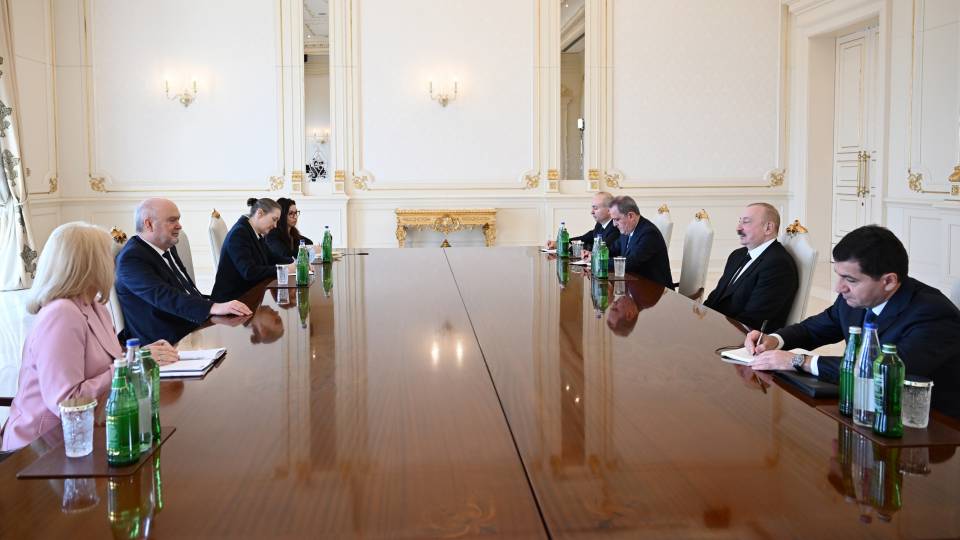
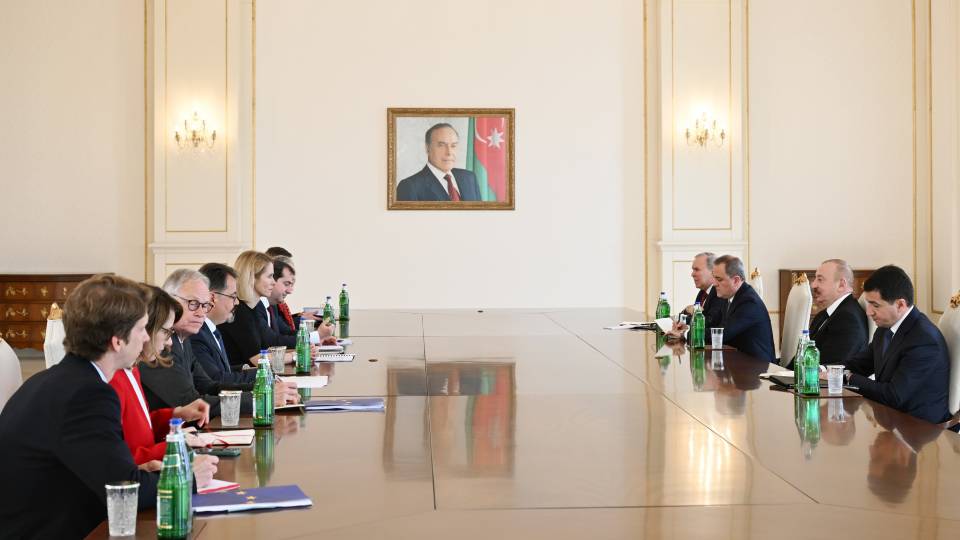
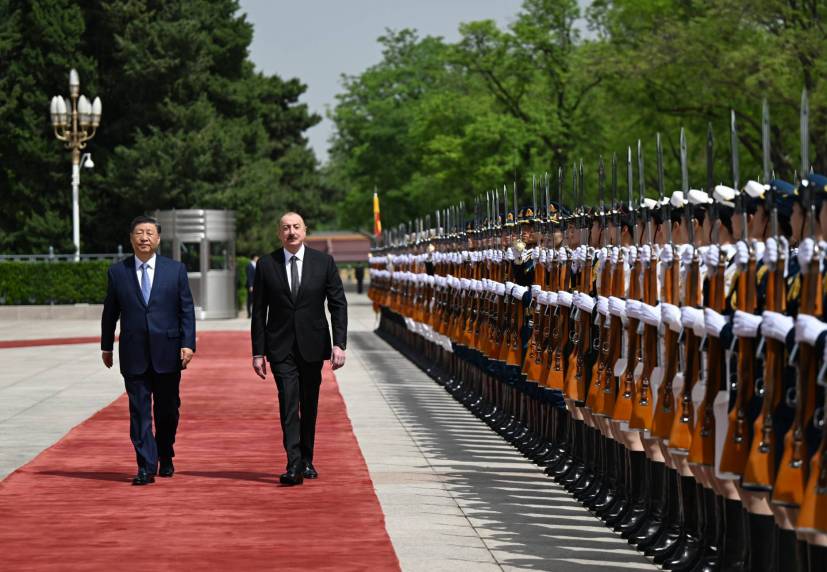
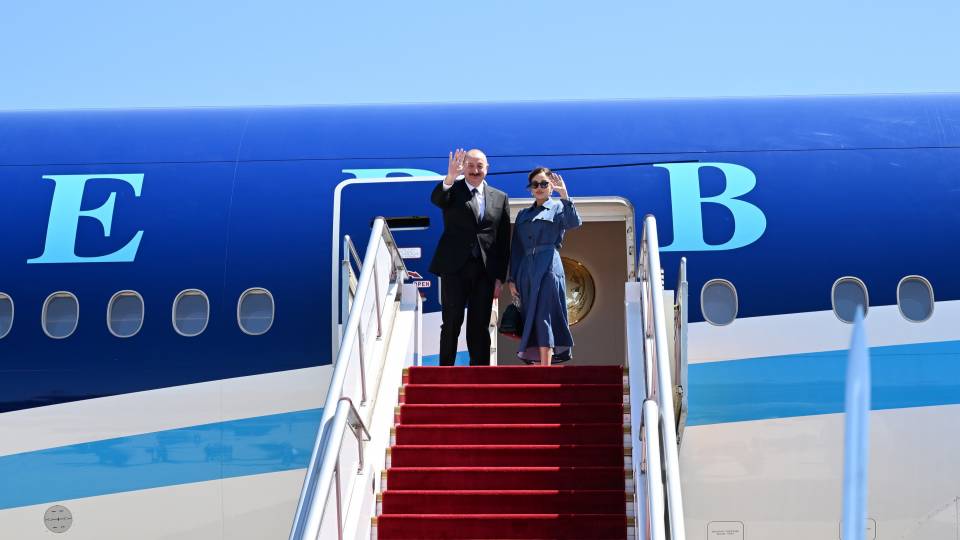
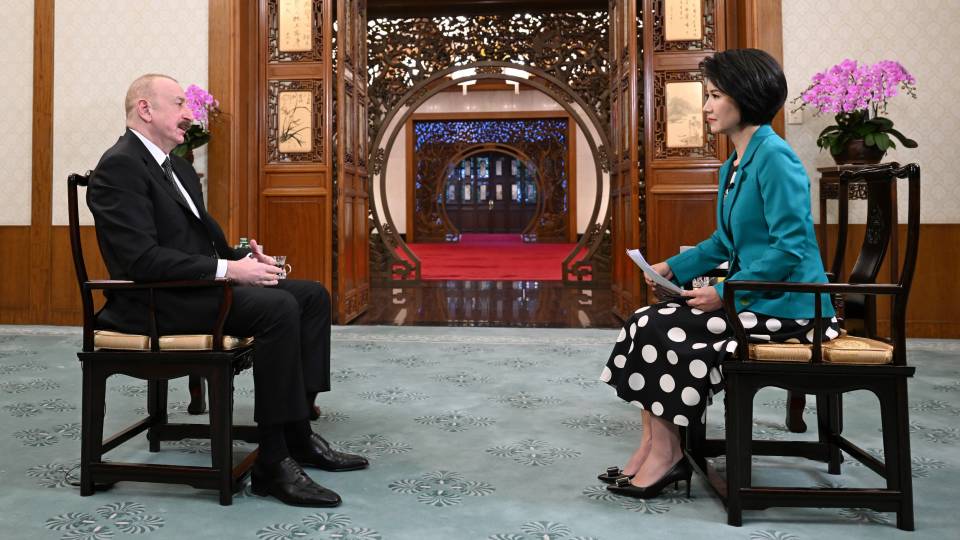
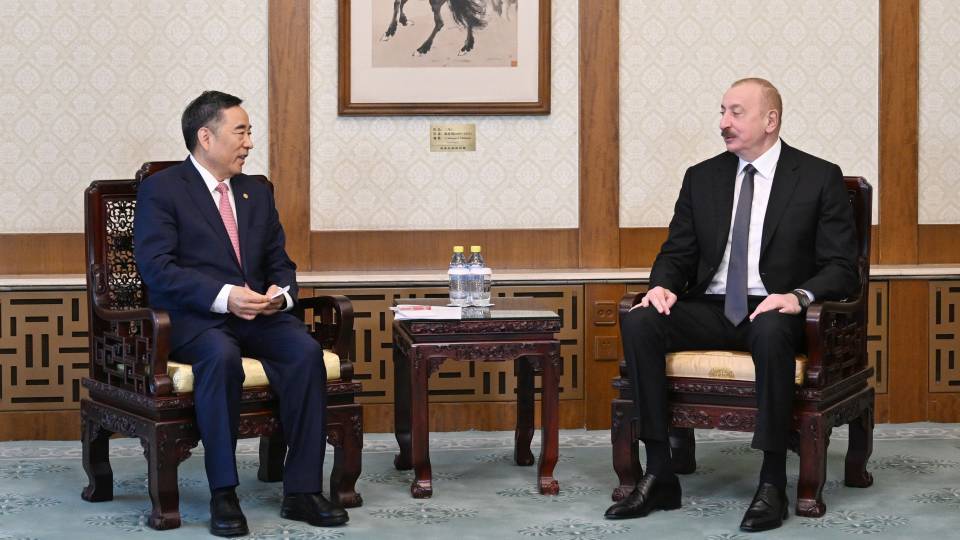
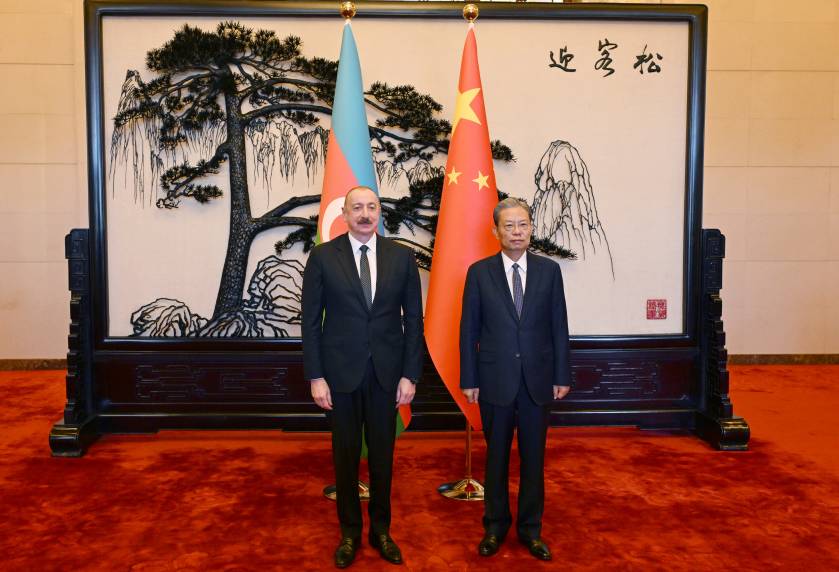
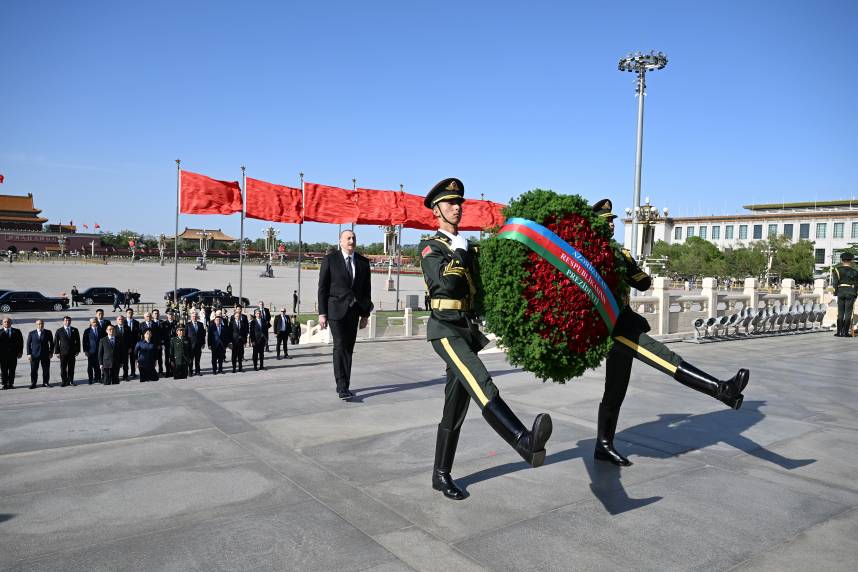
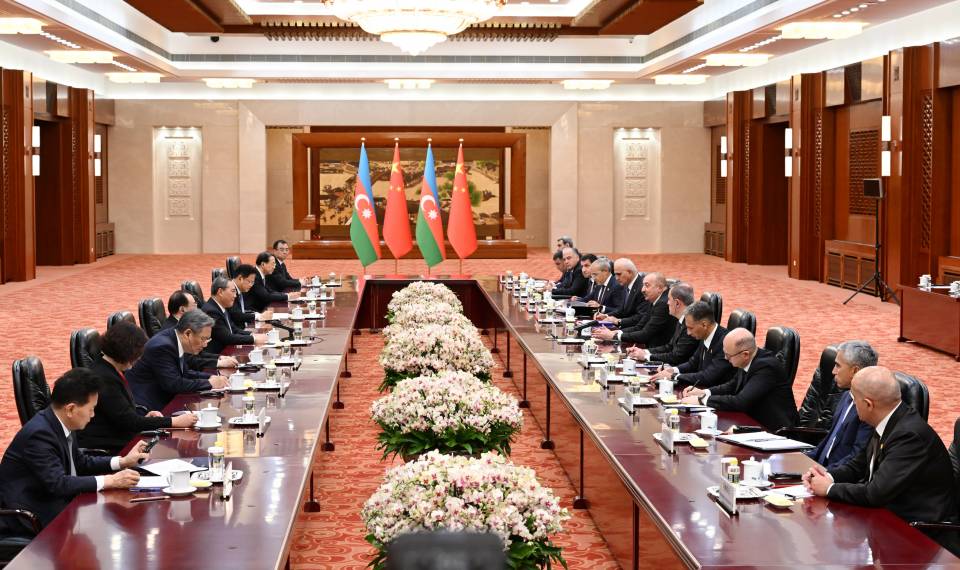
On April 23, President of the People's Republic of China Xi Jinping and First Lady Peng Liyuan hosted an official banquet in Beijing in honor of President of the Republic of Azerbaijan Ilham Aliyev and First Lady Mehriban Aliyeva.
23 April 2025, 12:15The “Joint Statement on the Establishment of a Comprehensive Strategic Partnership between the Republic of Azerbaijan and the People’s Republic of China” was signed in Beijing on April 23 during the state visit of President of the Republic of Azerbaijan Ilham...
23 April 2025, 10:57